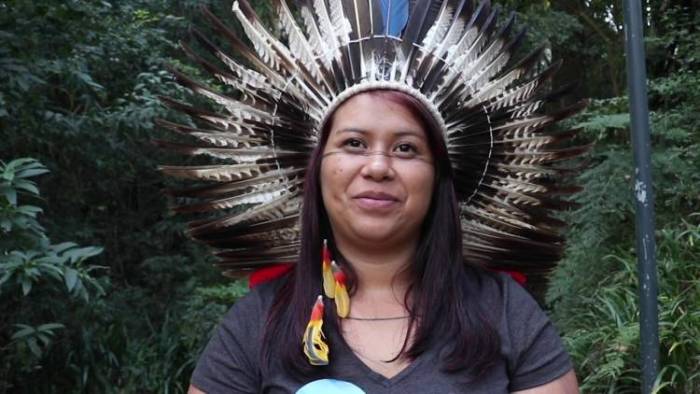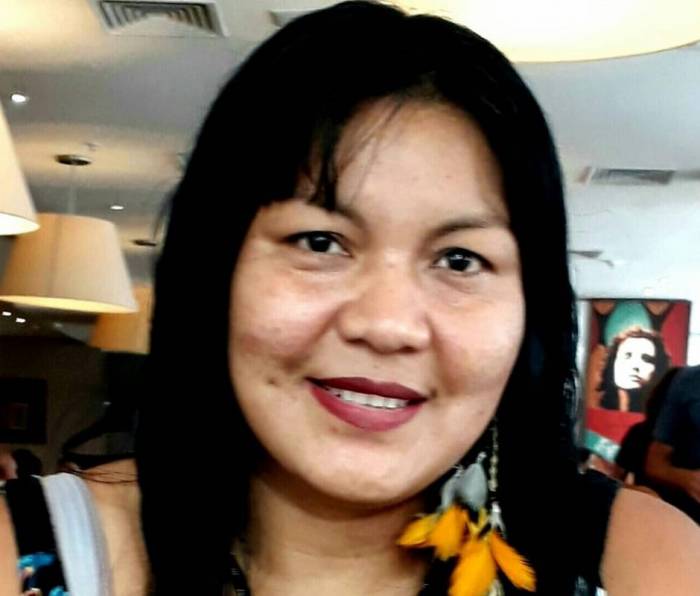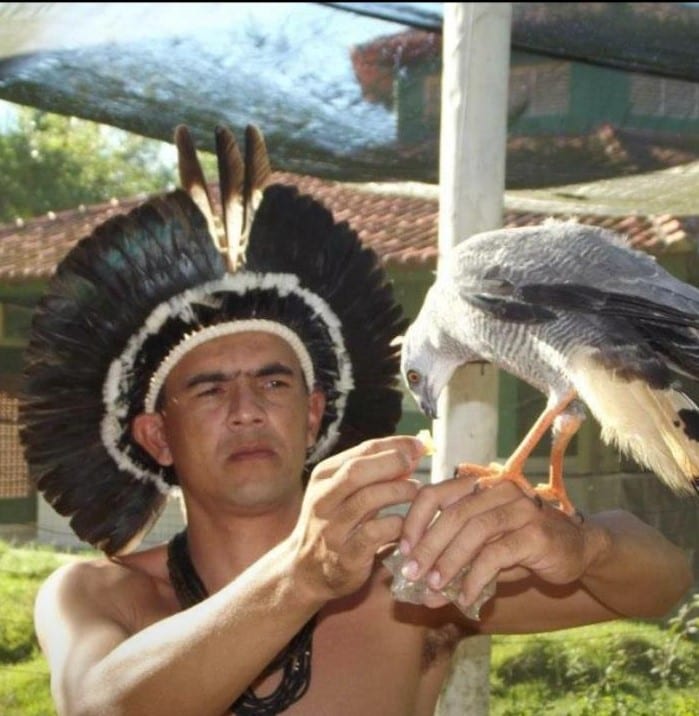With no exaggeration, it’s safe to say that without the work of Indigenous Peoples who have defended forests, rivers, lands and seas for centuries, all the planet’s inhabitants would be living in a more chaotic, overheated, polluted, and unfair world.
Indigenous People act not only as active guardians of natural territories, preventing other groups from engaging in environmentally destructive activities, but are also very effective at applying their traditional knowledge in the management and restoration of territories.
We at 350.org support and are following the participation of Latin American Indigenous leaders at the COP25 in Madrid. We want to share with you who some of these representatives are and how they’re leading the world’s most important climate summit, by sharing the strength and beauty of their traditional communities. Check it out below!
 Andreia Takua, from the Mbya Guarani People of the state of Paraná, Brazil
Andreia Takua, from the Mbya Guarani People of the state of Paraná, Brazil
Andreia is the President of South Coast Indigenous District Health Council (CONDISI South Coast) and Coordinator of the National Condisi Presidents Forum (FPCONDISI). She also works as the Coordinator for the Indigenous Programme at 350.org.
Her message at COP25
"We, the Indigenous People, want to be heard and consulted at COP25. There is much we have to say to the world and we want to leverage our voices, as we need real and immediate climate solutions. In order for this to work, native and traditional peoples know how to develop joint actions. We know how to defend and preserve, so we need to be heard and respected.”

Photo credit: Mídia Ninja
Luana Kaingang, from the Kaingang people of the state of Rio Grande do Sul, Brazil
Collaborator of the National Commission of Indigenous Youth working in the Indigenous collective of the Federal University of Rio Grande do Sul, where she studies dentistry. Luana lives in the village Tupe Pēn, in the metropolitan region of Porto Alegre. Beyond Rio Grande do Sul, her people currently live in different states such as São Paulo, Paraná and Santa Catarina.
Her message at COP25
“The protection of our bodies and our spirits comes from our Mother Earth. By keeping our forests, rivers and land in tact, we ensure the well-being of Indigenous and non-Indigenous Peoples, who are breathing and living today!”
 Kaiulu Yawalapiti Kamaiurá, from the Yawalapiti people of the state of Mato Grosso, Brazil
Kaiulu Yawalapiti Kamaiurá, from the Yawalapiti people of the state of Mato Grosso, Brazil
Kaiulu is the founder and president of the pioneering Yamurikumã Association of Xingu Women. As a female leader, she has encouraged the Xingu indigenous women to take on leadership roles. She joined the delegation of Chief Raoní Metuktire, in a campaign abroad to raise awareness to the international community about climate change and deforestation of the Amazon rainforest. Kaiulu is also an activist in Brazil, involved in campaigns focussed on environmental conservation and the demarcation of Indigenous Lands.
Her message at COP25
“I want to make clear to the 196 government leaders the need and demand of Indigenous Peoples for our full participation in the development of climate solutions, as Indigenous territories are already being affected. It is now necessary more than ever that adopted solutions and commitments adhere to this principle. ”
 Marcos Sabaru, from the Tingui-Boró people of the state of Alagoas, Brazil
Marcos Sabaru, from the Tingui-Boró people of the state of Alagoas, Brazil
Marcos is a tree nursery technician and defines himself as a continuous student of his culture. He is a member of both the Articulation of Indigenous Peoples and Organizations of NE, MG and ES (APOINME) and of the Steering Committee of the National Policy for Environmental and Territorial Management in Indigenous Lands (PNGATI). He was also the coordinator of social control of the District Council of Indigenous Health (CONDISI).
His message at COP25
"There is still time to save the planet. This requires protecting, conserving, focusing on this goal and being more responsible. ”
 Ninawa Inu Huni Kuī, from the Huni Kui people of Acre
Ninawa Inu Huni Kuī, from the Huni Kui people of Acre
Ninawa is president of the Huni Kui People’s Federation of Acre, with about 17,000 indigenous people from Brazil and Peru. He is an advisor to the Coordination of Indigenous Organizations of the Brazilian Amazon (COIAB), a member of the World Alliance of Mother Nature’s Guardians and a senior advisor to the Council of Indigenous Social Museology.
His message at COP25
“Our demand is to defend Indigenous Peoples and their rights to the environment, cultural empowerment, and their material and intangible heritage. Earth is essential to ensure the continuity of humans and our society. The biodiversity system, where the productive chain of life happens, is responsible for the climate patterns, which we humans - regardless of race, color and people - need to continue to live. We need to ensure a balance between the material and the spiritual. Therefore, from the simplest and most humble to those in political command, we are all dependent on these systems being in balance, because in the end we will all have an equal destiny, in which there is no difference. As long as we have time, let's keep Gaia, Mother Earth, alive and not cripple her, who has provided us with what we need to live. ”
What they’ve achieved at COP25
These six indigenous leaders, together with 350.org, Arayara and a number of local indigenous organizations, participated in the drafting of the Indigenous Climate Charter delivered to UN representatives at COP25 on the International Human Rights Day on December 10.
The Charter consolidates the climate crisis perspectives of the Indigenous Peoples of Latin America and expresses the challenges their communities face regarding the severe environmental transformations that are already affecting the planet. It presents a contribution of the Original Peoples to the dialogue on climate solutions.
The document was built over months through a structured consultation process with indigenous representatives from 11 countries: Argentina, Bolivia, Brazil, Chile, Colombia, Ecuador, Guyana, Mexico, Paraguay, Peru and Venezuela.
The Indigenous people also recall that they are amongst those most affected by violence against environmental defenders, as shown by the deaths committed against leaders in Brazil and other countries in the region, and call for more effective action by governments to protect the human rights of individuals who stand up for the protection of territories.
Watch the documentary:
In addition to delivering and disseminating the Climate Charter at COP25, these six leaders also represented their peoples’ views at debates on issues such as carbon markets and energy transition.
Another role these representatives held at Madrid was to ensure visibility for Indigenous Peoples’s demands for urgent climate action and environmental protection by governments. They participated, for example, both in the Climate March that brought together 500,000 people in the streets of Madrid, and in the protest in front of the Spanish oil and gas company Repsol headquarters to demand the end of fossil fuel exploration in Brazil and Latin America.
First-timers at COPs, this group is proving that it is past time for us to hear from communities that understand how to live in harmony with the planet. Motivated by their centuries-old wisdom which they have through culture and observation, Indigenous Peoples are pressing for change.